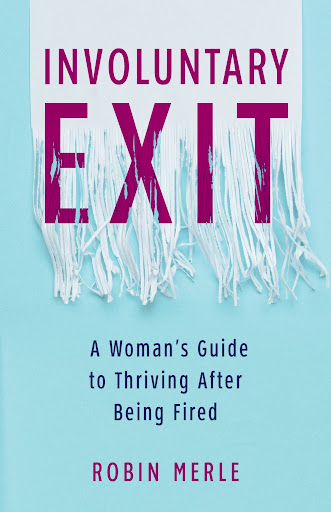An expert’s debut empowers women to be resilient after experiencing job loss
“a must-read for career-driven people of all genders” –Foreword Clarion Reviews
 New York, NY – A quick-witted and fast-paced self-help book from debut author and rainmaker, Robin Merle, dives into the emotional trauma of women whose job loss wasn’t part of the original plan. Involuntary Exit: A Woman’s Guide to Thriving After Being Fired (She Writes Press, Oct. 19, 2021) is about moving forward, illustrated by women’s remarkable stories of pain, progress, and purpose as they chart their own journey to more meaningful success.
New York, NY – A quick-witted and fast-paced self-help book from debut author and rainmaker, Robin Merle, dives into the emotional trauma of women whose job loss wasn’t part of the original plan. Involuntary Exit: A Woman’s Guide to Thriving After Being Fired (She Writes Press, Oct. 19, 2021) is about moving forward, illustrated by women’s remarkable stories of pain, progress, and purpose as they chart their own journey to more meaningful success.
It can take less than a minute to get fired. Less than a minute to hear the words that change your life as you’ve known it. You’re stunned, shocked, humiliated because your career has defined your life and you’ve been blindsided. You’re a company Loyalist with a capital L, and you’ve been sucker punched professionally. How do you even talk about this?
With advice for every unexpected twist, turn, and emotional trigger, this book is based on author Robin Merle’s experience at the top of billion-dollar organizations, as well as her interviews with accomplished women who were suddenly severed from their organizations and navigated their way back to success. The real-life examples she offers in these pages prove that readers are not alone and that they, too, can get through this. Whether being fired or needing to move on, Involuntary Exit will help readers rediscover their value and emerge as stronger leaders on their own terms.
Involuntary Exit: A Woman’s Guide to Thriving After Being Fired
Robin Merle | Oct. 19, 2021 | She Writes Press | Nonfiction/Self-Help
Paperback | 978-1647423094 | $16.95
“a nuanced look at the psychology of organizational loyalty and the grief that results from the end of a professional relationship” –Kirkus Reviews
 Robin Merle has been a senior executive for billion-dollar organizations. She is a veteran of the power, value, and identity wars at the top ranks; has raised more than a half-billion dollars in philanthropy during her decades working with nonprofit organizations; has served as a board member for three nonprofits in New York City; and has been the vice chair of National Philanthropy Day in New York for three consecutive years. In 2017, she was named Woman of Achievement by Women In Development (WID) for her leadership in fundraising and commitment to women in the field. Robin is a frequent speaker at national conferences on fundraising and leadership. Her short fiction has been published in various literary magazines. Involuntary Exit is her first nonfiction book. Robin splits her time between New York City and North Conway, New Hampshire and Maine. You can find Robin Merle at her website: https://theprofessionalguide.com
Robin Merle has been a senior executive for billion-dollar organizations. She is a veteran of the power, value, and identity wars at the top ranks; has raised more than a half-billion dollars in philanthropy during her decades working with nonprofit organizations; has served as a board member for three nonprofits in New York City; and has been the vice chair of National Philanthropy Day in New York for three consecutive years. In 2017, she was named Woman of Achievement by Women In Development (WID) for her leadership in fundraising and commitment to women in the field. Robin is a frequent speaker at national conferences on fundraising and leadership. Her short fiction has been published in various literary magazines. Involuntary Exit is her first nonfiction book. Robin splits her time between New York City and North Conway, New Hampshire and Maine. You can find Robin Merle at her website: https://theprofessionalguide.com
In an interview, Robin Merle can discuss:
- Why being fired is such a devastating experience, including the emotional, mental, and even financial toll of being fired
- How she conducted interviews with real women who were severed from their organizations, and what she learned from speaking with them
- How destigmatizing being fired can lead to community-building and personal growth
- Her advice for dealing with uncertainty in the workplace, especially as we are still evaluating the short- and long-term effects of the pandemic
An Interview with Robin Merle
1. Who is “Involuntary Exit” for? What types of readers will gravitate toward this book?
- Mid- to high-ranking professional women
- Women who are in senior management and women who want to get there someday
- Women who are more junior in their careers and looking for advice to navigate their careers forward
- Career-focused women, especially those who have been fired or who lost their job during the pandemic
- Anyone who is unemployed and who feels like they lost their identity when they lost their job
2. What inspired you to write this book?
There was no manual for dealing with this kind of loss. There was plenty about writing resumes, negotiating severances, etc. or self-congratulatory articles about rebounding, without any reference to how people managed themselves from the moment they heard their life at the company was over. I recognized there was a void, and I wanted to help as many women as possible.
3. What was the writing process like for you? How about the researching and interviewing phase?
It was like peeling an onion. The first draft came very quickly. As I began speaking with professional women, the stories unfolded and poured forward, and the writing process became dynamic. I was actually adding interviews two years after the first draft because of the impact of the pandemic. Everyone referred me to another woman with another story.
The interviews were eye-opening, validating, and therapeutic for almost all of the women, by their own admission. It was as if no one had ever asked them about something that was so commonplace, and they finally felt heard and not alone.
One of the most exhilarating aspects was following up with the women a year or two after they had been let go and hearing how happy they were, some at senior levels for a different company and some as founders and presidents of their own firms.
4. During the past year amid a global pandemic, countless women left their jobs to take care of their families. How will this book help those women should they return to the workforce down the road?
The book’s tactical advice is relevant to any job loss, whether involuntary or voluntary. My research found that the pandemic helped many women step back, reflect, and reinvent themselves during the “Shecession” (what economists have called the early months of the pandemic), which is a key strategy promoted in my book. In addition to encouraging big-picture thinking, the book addresses readers’ short-term and/or practical needs. For example, readers will hear about the nuances of networking for reentry. The book is filled with tips, takeaways, and advice based on real experiences, and is easy to flip through and refer back to when spirits sag or questions loom like How do I handle this?
5. “Involuntary Exit” also dives into the emotional and mental trauma of being fired. Is one of your goals to destigmatize being fired? What would it look like to shift the shame of that experience into something positive?
Yes, being fired can feel stigmatizing and I want to change this. What I learned in my research is that it was more uncommon if a woman had not been fired on her way to success. Hearing the stories of other women who have not only survived but prospered is part of the healing process. Knowing that you are not alone, that your feelings are valid, that there is empathy and community behind you is restorative. This is the antidote to withdrawing to a dark corner of your psyche dripping with shame. My hope is that readers will ultimately accept that being fired was a blessing in disguise that has helped them carve out a more rewarding life and a beautiful future.
6. What’s the one piece of advice you would give someone who has experienced a recent dismissal?
Don’t confuse moving quickly with moving forward. Take the time to assess your strengths and passions and determine if you want to replicate what you had or do something completely different, assuming you feel financially secure to do so. And, of course, read my book. Inside, you’ll find a community of women who will help you navigate your way back to success on your own terms.

A former award-winning journalist with national exposure, Marissa now oversees the day-to-day operation of the Books Forward author branding and book marketing firm, along with our indie publishing support sister company Books Fluent.
Born and bred in Louisiana, currently living in New Orleans, she has lived and developed a strong base for our company and authors in Chicago and Nashville. Her journalism work has appeared in USA Today, National Geographic and other major publications. She is now interviewed by media on best practices for book marketing.
